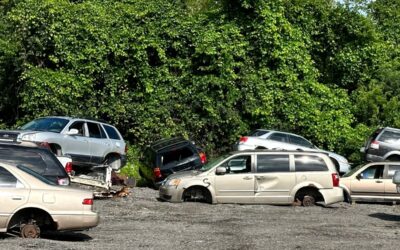Introduction
Abandoning a car might seem like a simple idea to get rid of a vehicle you no longer need. However, doing so can lead to legal trouble, environmental damage, and unexpected costs. In Canada, laws around vehicle disposal are strict. You can’t just leave your old car on the side of the road or park it somewhere and forget about it. If you do, you could face fines, towing fees, and even legal action.
Many car owners don’t know how to handle an old, wrecked, or unwanted vehicle. Whether your car doesn’t run anymore, has failed an emissions test, or costs more to repair than its actual value, you still have to dispose of it properly. This blog explains everything you need to know before abandoning a car. You will learn the legal rules, the risks, and the better alternatives, like using a licensed auto recycler. If you want to avoid problems and handle your car the right way, stay till the end.
What is an Abandoned Car?
A car is considered abandoned when it’s left unattended on public or private property without permission for a certain amount of time. Each province or municipality may have slightly different rules, but here are some general signs a vehicle is abandoned:
-
- No license plates or expired registration
- Flat tires, broken windows, or major visible damage
- Parked in the same spot for days or weeks
- No proof of ownership or contact from the owner
In cities like Toronto, municipal laws allow local authorities to tow and scrap vehicles if they believe the car is abandoned. If the city tows your car, you will need to pay towing and storage fees to get it back. If you wait too long, the city might auction or recycle it without further notice.
Fines and Legal Risks of Abandoning a Car in Ontario
If you leave a vehicle anywhere without following the law, it can lead to serious problems. Here are the main risks you face if you abandon a car:
1. Fines and Penalties
Municipal bylaws across Ontario and other provinces allow cities to issue fines to car owners who abandon vehicles. These fines can range between $250 and $5,000, depending on the location and how long the car has been left.
2. Towing and Storage Charges
Once a city tows your car, you must pay to retrieve it. Charges can include towing, daily storage fees, and admin costs. Failure to pay within a certain timeframe may result in the city taking ownership of the vehicle.
3. Legal Liability
You might be held responsible if someone gets hurt or a fire starts because of your abandoned vehicle. For example, leaking fluids or rusted metal parts can cause safety hazards. Abandoning a car near water or wooded areas also creates environmental risks, and you could be fined under environmental protection laws.
Environmental Impact of Abandoned Cars
Leaving a car sitting outside for too long can seriously hurt the environment. Old vehicles have harmful materials like:
-
- Engine oil
- Brake fluid
- Transmission fluid
- Battery acid
- Coolant
When left for long periods, these fluids can leak into the soil and groundwater. This can poison wildlife, harm local plants, and pollute water systems.
Tires, plastics, and old car batteries take decades to decompose and often release toxins in the process. They stay in the environment for decades and release harmful chemicals. That’s why you must never leave a car to sit and decay. Licensed auto recyclers handle these materials safely. They follow laws to keep harmful substances out of the environment.
Also Read: Environmental Regulations You Must Know Before Scrapping Your Car
Abandoning a Car on Private Property
Some car owners think they can leave a dead car in their driveway or backyard without worrying about it. But cities have property standards that cover this issue.
If your vehicle is:
-
- Inoperable
- Not plated
- Visibly damaged
- Missing parts
Then you can get a notice from your local bylaw officer. You might be ordered to remove your car within a few days. If you don’t act, the city can tow the vehicle at your expense and issue a fine. In condo buildings or apartment lots, it’s even stricter. Property managers often remove unclaimed or damaged vehicles without warning. If your vehicle is towed and you fail to prove ownership quickly, you may permanently lose it.
Better Alternatives to Abandoning a Vehicle
Never abandon your car without taking proper steps; here are some better alternatives to become more responsible.
1. Sell It for Scrap
If your car doesn’t run or is too damaged, it might still have value. Car scrapyards and auto recyclers will pay you for it. Prices depend on the weight and metal value, but you can earn a few hundred dollars for even the worst vehicles.
Auto recyclers safely drain fluids, remove usable parts, and recycle the metal. This protects the environment and keeps your name clear of any issues.
2. Donate the Car
Some Canadian charities accept old cars. They take care of the paperwork, towing, and disposal. You may also get a tax receipt for your donation. This is a good option if your car has no resale value and you want to support a cause.
3. Trade It In
If your car still runs, you might trade it in when buying a new one. Even if it’s not worth much, some dealerships offer incentives for trade-ins.
Also Read: 5 Signs It’s Time to Scrap Your Old Car: A Canadian Driver’s Checklist
How Ontario Cities Handle Abandoned Vehicles
Cities across Canada have increased efforts to deal with abandoned vehicles. In cities like Toronto, abandoned vehicle complaints are common and handled by the Toronto Police Parking Enforcement Unit, which removes these cars to keep streets clear and safe.
Ajax is part of the Durham Region, and it handles abandoned vehicles a bit differently. Complaints go through the Durham Regional Police or local by-law officers, depending on where the car is found. On public roads, police may tow the car if it’s a hazard. On private property, bylaw officers get involved and give the owner time to remove it.
North York follows the same process as the rest of Toronto, but abandoned cars are more common around older apartment blocks and side streets. Residents often report cars sitting for weeks with flat tires or missing parts.
Scarborough has large areas with less traffic, which makes it a hotspot for abandoned cars. Some cars remain abandoned on quiet streets for months. The Toronto Police’s Parking Enforcement team handles these cases, too, but it can take longer for removal because the vehicles don’t block roads or pose safety issues.
Conclusion
If you are stuck with an unwanted vehicle in the Greater Toronto Area, don’t leave it abandoned. It’s risky, illegal, and harmful to the environment. The better choice is to contact a trusted auto recycler. The company offers scrap car removal services in various cities like Ajax, Scarborough, North York, Blackstock, Toronto, and more. The team handles pickup, paperwork, and recycling. You will get fair value for your vehicle, and you won’t need to worry about hidden fees or legal trouble. Call Greenway Auto Recycling today to schedule your free pickup and handle your car the right way.





